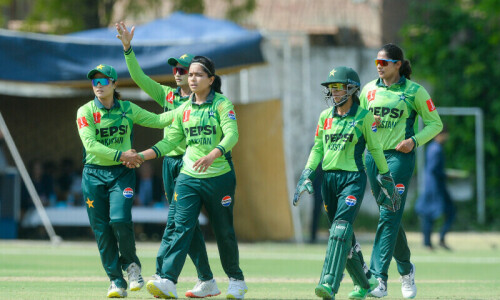
• Many moved to ‘safer places’ after medical colleges close, hostels shut due to violent protests
• Those still left face food shortage, dare not venture out due to risk of being accosted
• FO advises Pakistani students not to get involved in the protests
WHEN Irfan*, a final-year medical student from Pakistan, returned to Dhaka after vacations last month, he could have never imagined the dramatic turn his life would take in the days to come.
Over a matter of days, he found himself face to face with blood-soaked bodies, faced a curfew and has been forced to hide in hostel rooms to save himself.
“There’s still a curfew; we don’t know how long it will last,” he told Dawn from the Bangladesh capital.
The principal of their college, he said, had indicated that the campus could remain closed for two to three weeks.
Each year, 23 students from Pakistan are selected under the South Asian Association for Regional Cooperation (Saarc) quota to study in Bangladesh.
According to official estimates, around 144 Pakistani students are there at the moment, most of them studying medicine.
The unrest which paralysed the country for several days, erupted last week when police and the youth wing of the ruling Awami League sought to quell student protests against job quotas for civil service hires.
The quota system, introduced by the current PM’s father Sheikh Mujibur Rehman in the 1970s, reserves nearly a third of all government jobs for the families of veterans from the war with Pakistan.
As Irfan returned to Dhaka, anti-quota protests were underway, but the situation took a turn for the worse on July 16, when a fight broke out among students at his college.
Soon afterwards, a notification was issued instructing local students to vacate the hostels. Internet services were suspended over the next couple of days, and from July 19, a curfew was imposed in Dhaka and several other cities.
Dawn also faced difficulty in contacting Pakistani students in the country, mostly due to intermittent internet connectivity there.
“Since the situation deteriorated, we have been unable to contact our families,” Irfan said. “Students here have tried to make international calls, but due to distortion, the calls aren’t going through.”
Muhammad Javaid, a Mianwali resident, has two daughters studying in different medical colleges in Dhaka. Following the escalation, he lost contact with both for two days, finally writing to an additional secretary at the PM Office, detailing the plight of students in Bangladesh and requesting government assistance for their safety.
Mr Javaid said the Ministry of Foreign Affairs facilitated communication between the parents and their children, and when he finally made contact with his daughter they told him some students had been relocated by the embassy.
Relocations
Last week, Foreign Office Spokesperson Mumtaz Zahra Baloch had reassured that all Pakistani students were safe and had been moved to secure locations.
“The High Commission has accommodated students at safe locations including the High Commission itself, the ambassador’s residence, and other secure sites,” Ms Baloch said in a statement.
“Our mission in Dhaka is in constant contact with all students. The Deputy High Commissioner has visited Chittagong to meet students there as well. All students are safe.”
But according to Irfan, while some students have been relocated, none of the 21 who study at his medical college have been allowed refuge there.
“The biggest problem here is food shortages,” he said, fearing that the curfew could be extended.
ATM cards are also not working, making it difficult to withdraw cash. “We can’t say how long we can survive in these circumstances,” he added.
According to him, the embassy was informed four days ago about the food shortages students were facing, but they have yet to receive any help.
A Chittagong-based Pakistani medical student, Wajih*, told Dawn it was tough going during the days of clashes. “We survived on noodles for five days. Now, we are all out of food and drinks.”
He said they were staying in their rooms for fear of being accosted if they step out, and were pinning their hopes on help from the embassy, even though officials had stopped responding to their calls.
Evacuations
Irfan told Dawn that students from India, Sri Lanka, Malaysia, Bhutan, and Iran also studied alongside them. He said that while the governments of Sri Lanka, Malaysia, and Bhutan had airlifted their students, most Indians were trying to leave the country on their own.
He urged Islamabad to hasten to do the same. Javaid, the father of two daughters, was more optimistic, though. Saying that he had initially sought evacuation, he is now hopeful that the situation will improve in a few days.
Dawn reached out to the Foreign Office to ask whether there were any plans to airlift the students still stranded in Bangladesh, but received no response.
There is a certain level of trepidation amongst the students, some of whom recalled being singled out as ‘Pakistanis’ during the protests. Supporters of the quota system call local student protesters ‘razakars’ (volunteers) – the same term used for those who supported the Pakistani army during the war of 1971.
However, Irfan was quick to point out that most locals are quite respectful once they learn the students are from Pakistan.
In a press briefing on Thursday, FO Spokesperson Mumtaz Zahra Baloch also advised Pakistani students in Bangladesh not to get involved in the protests. “As a matter of principle, we follow a policy of non-interference in internal affairs of other countries. And this is the first advice that our Mission in Dhaka gave to Pakistani students in Bangladesh,” she said.
- Names of some students have been changed to protect their identities
Published in Dawn, July 26th, 2024















































